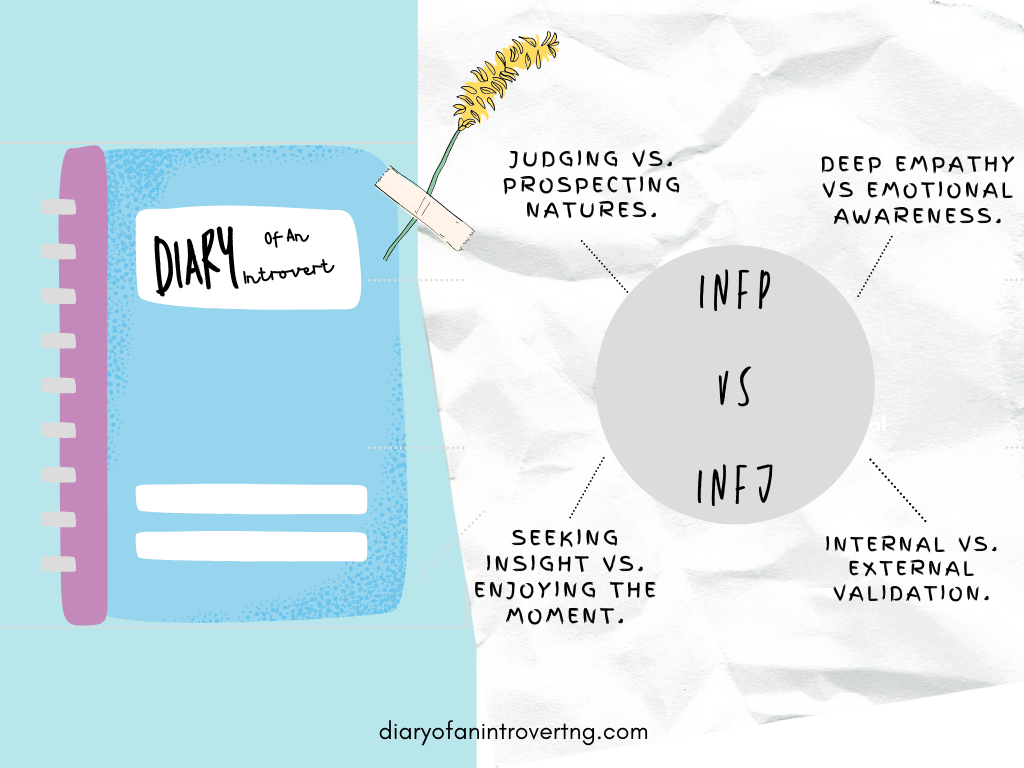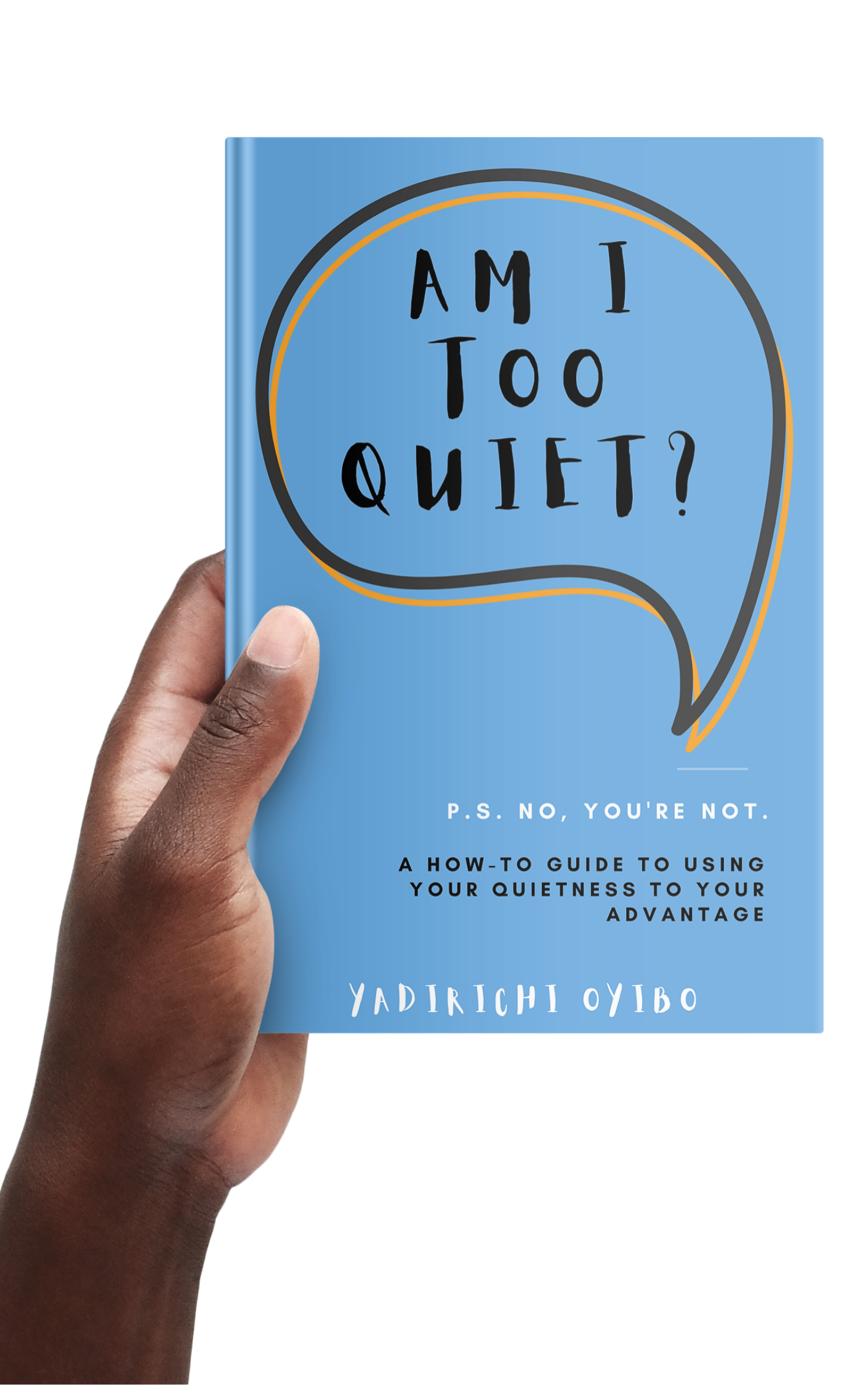7 Easy Differences if You’re Making INFJ vs INFP Comparisons
Photo by Tamara Schipchinskaya on Unsplash
People with INFJ and INFP personalities might seem similar, but they’re more different than people realize.
When making INFJ vs INFP comparisons, it’s vital to know the district traits of these personalities to tell them apart.
These caring, down-to-earth, and compassionate individuals might be hard to tell apart. More so, their functions are almost identical. Therefore, we’re here to make the work easier for you.
Are you asking yourself, “Am I INFJ or INFP?” and need answers? Or perhaps, you’ve taken the personality test more than once, and it gave you conflicting responses. We’re here to help with your INFP and INFJ confusions.
Below is a comprehensive INFJ INFP comparison that will help you know whether you (or someone else) is INFJ or INFP.
What are the INFJ Cognitive Functions?
According to the Myers Briggs Type Indicator, INFJ stands for the introverted, intuitive, feeling, judging personality type. See a detailed look at the cognitive functions INFJ here, to know how the brains of INFJs operate.
The I in INFJ stands for introverted, which refers to someone who prefers minimally stimulating environments and is reserved.
The N in INFJ stands for someone with an intuitive character. They rely mostly on their imagination and create their worlds based on past and present experiences.
The F in INFJ stands for someone who leans more to their feelings. They make decisions with their heart and rely less on logic.
The J in INFJ stands for the judging personality. People with this character trait tend to stick to routines instead of being impulsive.
What are the INFP cognitive functions?
INFP stands for the introverted, intuitive, feeling, prospecting personality type. See a detailed explanation of the cognitive functions INFP here, to know how the brains of INFPs operate.
The I, N and F in INFP is the same as the Advocate.
However, the P in INFP stands for the prospecting character. People with this character trait tend to enjoy a little bit of spontaneity instead of sticking to routines.
Why do the INFJ and INFP seem similar?
The major reason the INFJ and INFP personalities are similar is that they are both introverted. Also, they have strong dominant feeling and intuitive functions that people might find hard to differentiate—but are totally different according to their function stack.
People with these personalities are mostly quiet and lean more to their hearts when considering options.
More so, people with INFJ and INFP personalities have profound imaginative tendencies. They tend to rely on past and present experiences to drive their decisions.
Because these personalities have these in common, people often need ways to tell them apart. Here are seven prominent INFP vs INFJ differences.
7 Easy INFJ and INFP Differences
We will be making reference to the function stack of the INFJ and INFP personality types. For reference, here’s a preview of them:
INFJ Function Stack: Ni, Fe, Ti, Se.
INFP Function Stack: Fi, Ne, Si, Te.
Judging vs. prospecting natures.
Photo by Daniil Onischenko on Unsplash
One major INFJ and INFP differences are the J and P cognitive functions which stand for the judging and prospecting characters. This relates to how individuals with these personalities behave with several options. Would they choose to be flexible, or rather be premeditated? Whichever choice would show whether you’re INFJ or INFP.
In this scenario, the judging characteristics of the INFJ personality make them more deliberate. They would rather make conscious actions than leave things to the unknown. Individuals with this personality believe greatly in creating their futures rather than allowing them to happen spontaneously.
On the other hand, the prospecting characteristics of the INFP personality makes them more flexible. They would prefer to react to their environments rather than trying to control things. These individuals strongly believe that they can build luck from whatever the world delivers.
2. Deep empathy vs emotional awareness.
Photo by Marco Testi on Unsplash
Having deep empathy is a person’s ability to acknowledge and understand other people’s feelings. On the other hand, emotional awareness is a self-conscious state of recognizing and accepting one’s personal feelings. These two traits vividly separate the INFJ and INFP personalities. Thus, another INFJ and INFP difference is how these individuals respond to emotions.
People with INFJ personalities are called advocates for a reason. These individuals are driven to fix the wrongs they come across, making them incredibly empathetic. This can, however, make them negligent to their emotions. INFJs easily absorb both the positive and negative emotions of others and accept them as their own.
On the contrary, INFPs are more self-aware of their moods. Less empathetic than advocates, these individuals (referred to as mediators) are more reflective. They use their natural skill of emotional awareness to understand the human workings and express it. Some of the creative mediums they use include writing, music, art, and etcetera.
Breakdown:
INFJs are deeply empathetic due to their dominant Fe, which allows them to understand and absorb others' emotions. Their focus on external feelings can sometimes lead to neglecting their own emotions.
INFPs are more self-aware of their emotions, driven by their dominant Fi. They use their emotional awareness to reflect on their own feelings and understand human emotions, often expressing themselves through creative mediums like writing and art.
3. Seeking insight vs. enjoying the moment.
Some of the best INFP and INFJ differences lie in how these individuals react to certain scenarios. Still asking, “Am I an INFJ or INFP?” The best way to find out is to imagine your response to events. For example, suppose you were watching a play. Would you look out for the bigger picture, or merely enjoy the plot?
INFJs are known to look past appearances and focus on the core matter of things. This skill makes them excellent judges of characters and helps them build authentic relationships. They are deeply insightful, stemming from their desire to understand why events take place.
INFPs, on the other hand, have spontaneous natures. They wouldn’t mind watching a great play even if it had no moral lesson. They would choose to enjoy the ambiance of the event instead, and pay attention to the different moods of the characters, thereby, relishing in the moment.
Breakdown:
INFJs seek insight due to their Dominant Introverted Intuition (Ni), focusing on the core of things, making them insightful and excellent judges of character, leading to authentic relationships.
INFPs enjoy the moment due to their Auxiliary Extraverted Intuition (Ne), appreciating experiences without always seeking deeper meaning. They relish in the ambiance and moods of events, embracing spontaneity.
4. Internal vs. external validation.
Photo by Nathan Dumlao on Unsplash
Another brilliant INFP INFJ comparison is dealing with validation. People with INFJ and INFP personalities are both creative and on a mission to provide solutions to the world at large. While these things matter to these individuals, their thought processes towards achieving them are quite different.
An INFJ individual believes they have a greater purpose in life and are never satisfied with regular jobs. Their ideals are usually to make others happy. Therefore, they cherish internal validation more than anything else. Merely adding value to another person’s life is their motivation.
INFPs also have the same ideals but are more excited about showing off their achievements. They want to hear others’ opinions and receive encouragement for their labor. Therefore, people with INFP functions are more concerned about external validation. These are the factors that truly make them happy.
Breakdown:
INFJs value internal validation due to their Dominant Introverted Intuition (Ni) and Auxiliary Extraverted Feeling (Fe), finding purpose in making others happy and adding value to their lives through their ideals.
INFPs seek external validation due to their Auxiliary Extraverted Intuition (Ne), valuing feedback and encouragement for their achievements. They are more concerned with external recognition and appreciation.
5. Overthinking vs. assertiveness.
Photo by Laura Chouette on Unsplash
When faced with decisions, people with INFJ and INFP personalities tend to react differently. This process can be differentiated by their state of assertiveness or uncertainty. If you were asked to choose the best vacation destination for your family, would you be easily overwhelmed or give a definite response? Your response can decide whether you’re INFJ or INFP.
INFJs tend to be more confident when making decisions because of their judging traits. An INFJ would assess all their options and provide the most suitable response. Therefore, when asked to pick the best vacation destination, they’ll consider factors like the cost of the trip and everyone’s well-being before providing feedback.
INFPs, on the other hand, might overthink in a situation like this. Due to their prospecting quality, making decisions are often hard for these individuals. They’d rather be flexible without having to think about the consequences of their actions. This can easily get them nervous when a severe decision needs to be made.
Breakdown:
Even though INFJs overthink, they are more assertive in decision-making due to their Dominant Introverted Intuition (Ni) and Auxiliary Extraverted Feeling (Fe), carefully considering options and providing suitable responses.
INFPs tend to overthink decisions due to their Dominant Introverted Feeling (Fi) and Auxiliary Extraverted Intuition (Ne), being more flexible and prospecting, which can lead to uncertainty and nervousness in making choices.
Liking this article? Join our Introvert Club→
6. Withholding vs. expressing anger.
Photo by Karina Tes on Unsplash
Key INFJ and INFP differences can be seen in how these individuals express their anger. People with INFJ or INFP personalities naturally have reserved characters and wouldn’t flare up when angry. However, in certain scenarios, their responses tend to differ. Things like injustice, bullying, or being condescended can create several INFP INFJ differences.
INFPs get angry like other individuals but avoid conflict as much as they can. They would rather walk away from a dispute and express their displeasure in private. In some cases, an INFP might give a cutting response to an opposition; but would avoid having an altercation altogether.
INFJs also prefer to withhold and understand their anger before expressing it. This process might be time-consuming, and they’ll eventually feel it’s too late to share their pain. Nevertheless, INFJs are more prone to flaring up. An INFJ may remain silent when angered in private; but injustice or condescension towards others in public often makes them speak up.
Breakdown:
INFJs prefer to withhold and understand their anger due to their Dominant Introverted Intuition (Ni) and Auxiliary Extraverted Feeling (Fe), sometimes leading to delayed responses or outbursts in the face of injustice.
INFPs avoid conflict and may express anger privately or through cutting remarks due to their Dominant Introverted Feeling (Fi), choosing to walk away from disputes to maintain peace.
7. A laid-back style vs keeping appearances.
Photo by Andreea Pop on Unsplash
Another key difference between these personalities is the INFP vs INFJ appearance. The attention you give to your looks can determine whether you’re INFJ or INFP. Do you have a relaxed style? Or do you care about your image once in a while?
INFPs notably spend more time in their heads than in front of a mirror. These individuals pay attention to basic grooming but aren’t too particular about keeping appearances. They’d rather opt for an easy-going and comfortable look than wear anything that drags too much attention to themselves.
INFJs, on the other hand, are sparingly concerned about their appearances. They could either be obsessed with it or not care at all. In a nutshell, their mood defines how much time they spend getting dressed. INFJs notably have high standards and would rather opt for a few great clothes than many mediocre ones.
Breakdown:
INFJs may vary in their concern for appearances based on their Dominant Introverted Intuition (Ni) and Auxiliary Extraverted Feeling (Fe), sometimes being meticulous about their image or opting for a relaxed style.
INFPs focus more on comfort and ease in their appearance due to their Dominant Introverted Feeling (Fi), paying basic attention to grooming but not overly concerned with keeping up appearances.
FAQs
Am I INFP or INFJ?
Certain criteria can answer the question, “Am I an INFP or INFJ?” You can observe your level of spontaneity versus your organizing skills, or watch your empathy level versus your emotional awareness. These factors can determine whether your INFJ or INFP.
Can you be both INFP and INFJ?
It’s impossible to be both INFP and INFJ because these individuals have separate qualities. While they may seem similar, certain traits like judging versus prospecting tell these personalities apart. You might have a little of both characters, but one would be more pronounced, thereby, revealing your personality.
Are INFPs smarter than INFJs?
There’s no statistical evidence that shows whether INFJ or INFP is smarter. Nonetheless, these two personalities relatively have great IQs. Their introverted and intuitive natures make them think beyond natural levels and gives them a peculiar sense of understanding.
Why are INFPs and INFJs so similar?
These two personalities are similar because of their functions. They both have introverted, intuitive, and feeling character traits. The only difference is in their judging and prospecting characters. Some INFJ vs INFP examples such as Martin Luther King Jr. and Princess Diana also have similar qualities.
Are INFP and INFJ a good match?
INFJ and INFP personalities are highly compatible because of their similarities. Since they are both calm and empathetic, these individuals can learn to build a stable relationship together. Their ethics and principles are likely to align better than other pairings.
Live Your Best Quiet Life
CONCLUSION
Did you enjoy this article? Understand that you could either be INFJ or INFP, but not both. Some of the traits might be confusing to tell apart, but with closer observation, you’ll know what characters you’re prone to exhibit. Kindly leave a comment if you liked this article or share it with others.





















